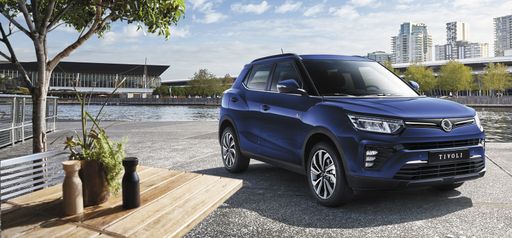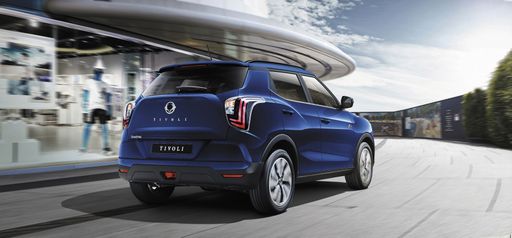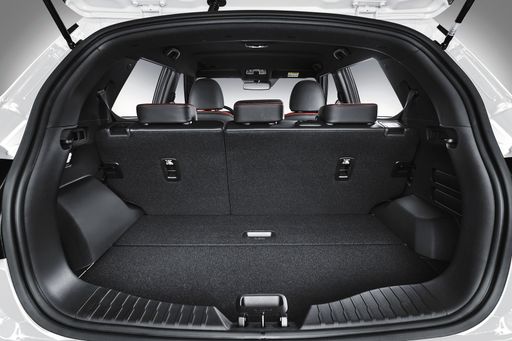Hyundai Bayon vs SsangYong Tivoli - Differences and prices compared
Compare performance (90 HP vs 163 HP), boot space and price (20100 £ vs 21400 £ ) at a glance. Find out which car is the better choice for you – Hyundai Bayon or SsangYong Tivoli?
Costs and Efficiency:
Looking at overall running costs, both models reveal some interesting differences in everyday economy.
Hyundai Bayon has a barely noticeable advantage in terms of price – it starts at 20100 £ , while the SsangYong Tivoli costs 21400 £ . That’s a price difference of around 1363 £.
Fuel consumption also shows a difference: Hyundai Bayon manages with 5.80 L and is therefore distinct more efficient than the SsangYong Tivoli with 7 L. The difference is about 1.20 L per 100 km.
Engine and Performance:
Power, torque and acceleration are the classic benchmarks for car enthusiasts – and here, some clear differences start to show.
When it comes to engine power, the SsangYong Tivoli has a decisively edge – offering 163 HP compared to 90 HP. That’s roughly 73 HP more horsepower.
There’s also a difference in torque: SsangYong Tivoli pulls noticeable stronger with 280 Nm compared to 172 Nm. That’s about 108 Nm difference.
Space and Everyday Use:
Cabin size, boot volume and payload all play a role in everyday practicality. Here, comfort and flexibility make the difference.
Both vehicles offer seating for 5 people.
In curb weight, Hyundai Bayon is to a small extent lighter – 1175 kg compared to 1375 kg. The difference is around 200 kg.
In terms of boot space, the SsangYong Tivoli offers clearly more room – 720 L compared to 411 L. That’s a difference of about 309 L.
When it comes to payload, Hyundai Bayon minimal takes the win – 460 kg compared to 455 kg. That’s a difference of about 5 kg.
Who wins the race in the data check?
The SsangYong Tivoli is clearly superior overall in the objective data comparison.
This result only shows which model scores more points on paper – not which of the two cars feels right for you.
Costs and Consumption
View detailed analysis
Engine and Performance
View detailed analysis
Dimensions and Body
View detailed analysis

SsangYong Tivoli
Hyundai Bayon
The Hyundai Bayon slips neatly between city runabout and small SUV, offering surprising practicality and a fresh, confident design that stands out in urban traffic. It's an easy buy for shoppers who want smart packaging, tidy handling and a dash of personality without fuss — a sensible little crossover that makes everyday driving a bit more enjoyable.
details




SsangYong Tivoli
The SsangYong Tivoli is an unpretentious small crossover that surprises with a roomy, well-finished cabin and an agreeable ride that suits everyday life. It won't win any beauty contests, but it's a smart, economical choice for buyers who value practicality, comfort and a bit of cheeky character.
details


Costs and Consumption |
|
|---|---|
|
Price
20100 - 25800 £
|
Price
21400 - 30300 £
|
|
Consumption L/100km
5.80 L
|
Consumption L/100km
7 - 8.3 L
|
|
Consumption kWh/100km
-
|
Consumption kWh/100km
-
|
|
Electric Range
-
|
Electric Range
-
|
|
Battery Capacity
-
|
Battery Capacity
-
|
|
co2
130 - 132 g/km
|
co2
161 - 191 g/km
|
|
Fuel tank capacity
-
|
Fuel tank capacity
50 L
|
Dimensions and Body |
|
|---|---|
|
Body Type
SUV
|
Body Type
SUV
|
|
Seats
5
|
Seats
5
|
|
Doors
-
|
Doors
5
|
|
Curb weight
1175 - 1200 kg
|
Curb weight
1375 - 1492 kg
|
|
Trunk capacity
411 L
|
Trunk capacity
395 - 720 L
|
|
Length
-
|
Length
4225 - 4480 mm
|
|
Width
1775 mm
|
Width
1810 mm
|
|
Height
-
|
Height
1613 - 1646 mm
|
|
Max trunk capacity
-
|
Max trunk capacity
1115 - 1440 L
|
|
Payload
450 - 460 kg
|
Payload
425 - 455 kg
|
Engine and Performance |
|
|---|---|
|
Engine Type
Petrol
|
Engine Type
Petrol
|
|
Transmission
Manuel, Automatic
|
Transmission
Manuel, Automatic
|
|
Transmission Detail
Manual Gearbox, Dual-Clutch Automatic
|
Transmission Detail
Manual Gearbox, Automatic Gearbox
|
|
Drive Type
Front-Wheel Drive
|
Drive Type
Front-Wheel Drive, All-Wheel Drive
|
|
Power HP
90 HP
|
Power HP
163 HP
|
|
Acceleration 0-100km/h
11.9 - 13.3 s
|
Acceleration 0-100km/h
-
|
|
Max Speed
-
|
Max Speed
175 - 181 km/h
|
|
Torque
172 Nm
|
Torque
260 - 280 Nm
|
|
Number of Cylinders
3
|
Number of Cylinders
4
|
|
Power kW
66 kW
|
Power kW
120 kW
|
|
Engine capacity
998 cm3
|
Engine capacity
1497 cm3
|
General |
|
|---|---|
|
Model Year
2025
|
Model Year
2021 - 2024
|
|
CO2 Efficiency Class
D
|
CO2 Efficiency Class
F, G
|
|
Brand
Hyundai
|
Brand
SsangYong
|
What drivetrain options does the Hyundai Bayon have?
The Hyundai Bayon is available as Front-Wheel Drive.
